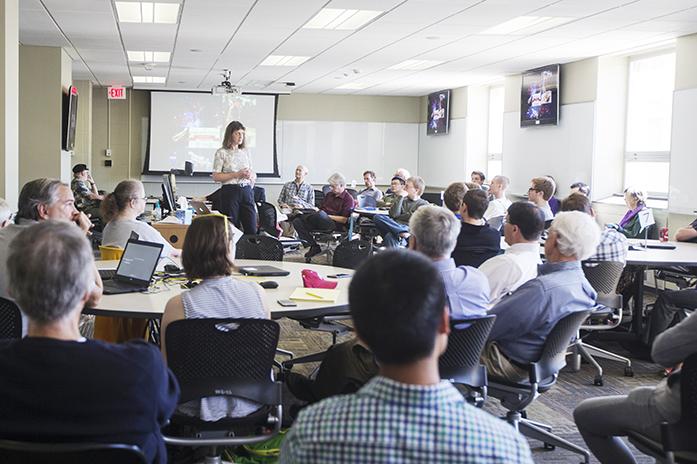By Shelby Leisinger
Van Allen Hall, namesake of the legendary James Van Allen, welcomed another scientific great on Monday as MIT alumna and astrophysicist Jennifer Wiseman shared her unique take on religion and science.
The Geneva Lecture Series hosted Wiseman for a two-part speaking engagement focusing on her work with telescopes and new discoveries being made.
The lecture series was free and open to the public, but the audience was composed primarily of those interested in science and space exploration.
The event coincides with the Geneva Campus Ministry, whose main goal is to engage in exploration of Christianity and religion, but not just from a faith perspective, Geneva Director Thomas Wolthuis said.
“There’s been too much bad press about a conflict between Christianity and science, and we don’t believe there is such a conflict,” he said. “We think that there’s a cooperation, and so we wanted to address that [with Wiseman’s lecture], which worked very well.”
Wiseman’s speech on Tuesday was a smaller lecture with approximately 40 people in attendance, and Monday’s was larger and more available to members of the community.
“It can be humbling as we realize that our galaxy is one of hundreds of billions of galaxies, so in that sense it can make us feel insignificant,” Wiseman said. “On the other hand, I believe these explorations can give us not only a sense of awe and wonder but to reflect upon ourselves, and to reflect upon our history, and to start asking those deeper questions about how should we live with this knowledge?”
Wiseman’s work uses a suite of different telescopes, including radio telescopes, optical telescopes, and the Hubble telescope to understand the different stages that stars go through in interstellar clouds and how these conditions promote planetary systems to form, she said.
Several physics students were given a chance to speak with Wiseman on her work with telescopes. Manuel Martinez, a UI graduate student in physics and a leader in the Geneva Campus Ministry, said he appreciated Wiseman’s combination of science and humility.
“For some people, science has become a religion,” he said. “They believe that science is able to answer not just scientific but philosophical questions, too, and I don’t think that’s the case. She was able to give her insight into that. Science can give us some perspective, but it’s not the only way of acquiring knowledge.”
Where there are gaps in between what humans have discovered and what is still not understood, Wiseman has her faith.
“For me, a foundation of faith has given me a sense of wonder and appreciation for all of nature and curiosity about what’s out there,” she said. “Faith has given me a sense of hope and interest for what we might not yet know yet but what we can discover when we look a little bit harder.”
Advanced telescopes have been able to discover new exoplanets, planets outside our Solar System that have atmospheres, and with continuing advances in the space exploration, scientists may be able to detect biological activity.
“It gives us a sense of the progression of the Universe as it started from a burst of energy and now involves life on at least one planet,” Wiseman said. “It raises philosophical questions that are beyond science. For example, ‘What is the future for the Universe?’ And, ‘Why are we here?’ ”



